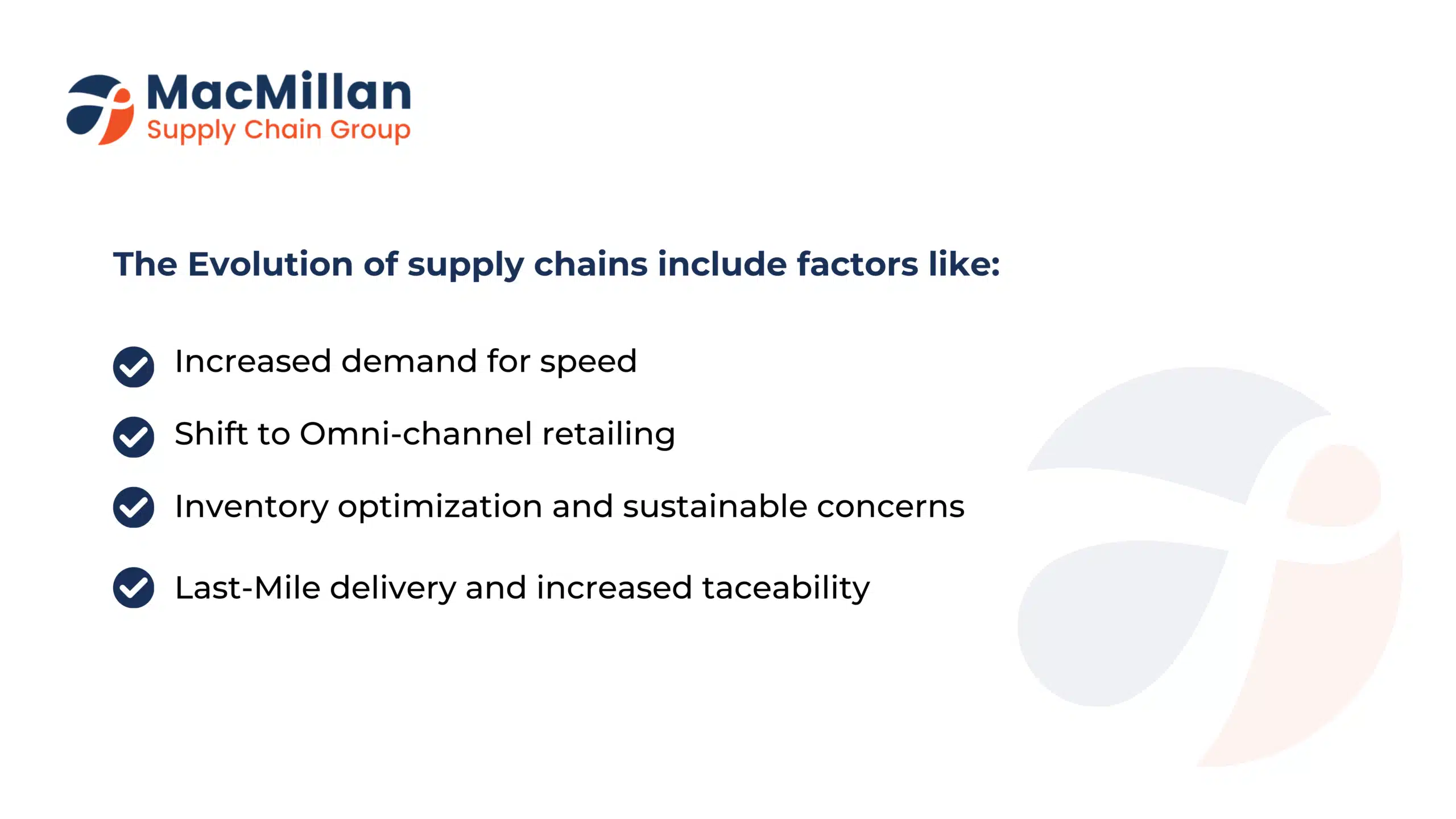In recent years, the landscape of commerce has experienced a shift with the advent of e-commerce, changing business operations. This transformation is particularly pronounced in supply chain management. As online shopping demand continues to grow, supply chains have been forced to adapt and evolve to meet the demands of this new era.
In this article, we will explore the significant impact of e-commerce on supply chain management, highlighting the key changes and strategies that have emerged in response.

The Evolution of Supply Chains
Traditionally, supply chains were structured to move goods from manufacturers to physical retail stores on a predictable schedule, with inventory levels managed based on historical sales data. However, the rapid growth of e-commerce has completely disrupted this model. Factors include:
Increased Demand for Speed
E-commerce customers expect fast delivery, prompting supply chains to become more agile and responsive. This shift has led to the rise of same-day and next-day delivery options, requiring more efficient inventory management and transportation logistics.
Shift to Omnichannel Retailing
E-commerce has blurred the lines between online and offline retail. Many businesses now operate in an omnichannel environment, where customers can purchase items online, in-store, or through a mobile app. This integration across various channels ensures consistency and accuracy in inventory levels and order fulfillment.
Inventory Optimization
With the ability to shop online 24/7, customers expect a wide selection of products. Supply chains must efficiently manage inventory to meet this demand without overstocking or understocking. Data analytics and demand forecasting have become essential tools in this process. MacMillan provides real-time visibility and demand forecasting trends to help you optimize operations.
Last-Mile Delivery Challenges
The last mile of delivery, from the distribution center to the customer’s doorstep, has become one of the most challenging aspects of supply chain management. E-commerce companies are exploring innovative solutions, including drone and autonomous vehicle deliveries, to address this challenge efficiently.
Increased Traceability
E-commerce has heightened the need for transparency in supply chains. Blockchain technology and other traceability solutions are being employed to provide this information.
Sustainability and Environmental Concerns
As e-commerce grows, so do concerns about its environmental impact. Supply chain management is increasingly focused on sustainability, with companies exploring greener transportation options and eco-friendly packaging.
The Impact of e-Commerce on Logistics
Online shopping platforms like Amazon and eBay have provided consumers with unprecedented convenience, allowing them to purchase everything from groceries to high-end electronics from the comfort of their homes. This shift in consumer behavior has demanded a significant transformation in logistics and supply chain operations.
So, what exactly is the impact of e-Commerce on logistics? In essence, it triggers a chain reaction of changes across the entire supply chain. Let’s delve deeper into these transformative effects.
Supply Chain in the Digital Age
Unlike traditional marketing strategies, which relied heavily on physical stores and had limited reach, the digital era has revolutionized marketing approaches. Online advertisements, social media marketing, and personalized recommendations are now integral components of the e-commerce experience.
E-commerce companies, driven by data analytics and AI, harness consumer data to offer tailor-made product recommendations and targeted marketing campaigns. This data-driven approach not only boosts sales but also streamlines logistics operations.
MacMillan predicts consumer behavior and demand based on historical tracking and analysis to optimize their supply chains, leading to cost savings and increased efficiency. Moreover, e-commerce platforms have become marketing powerhouses, providing a platform for third-party sellers and creating a vast marketplace.
Challenges in the Logistics Industry
A strong online presence is equally critical to not only survive but to excel in this increasingly competitive digital realm. This is where digital marketing becomes the catalyst for success.
Without a robust digital marketing strategy, even the most efficient logistics can fall short in the quest to capture and retain customers in the vast and dynamic world of eCommerce. Here are some challenges in supply chains:
Complex Target Audience
Identifying and reaching the right audience can be intricate in logistics, as customers may range from individual consumers to global corporations. Tailoring marketing efforts to each segment is demanding and requires a nuanced approach.
Data Management
The logistics sector generates vast amounts of data. If not efficiently managed, this data can lead to inefficiencies and missed opportunities for personalization and optimization. Effective data management is crucial for leveraging insights and improving operations.
Competition and Visibility
The digital landscape is saturated, making it challenging for logistics companies to stand out. Achieving online visibility amid fierce competition requires strategic and innovative digital marketing efforts.
Trust and Reputation
In logistics, trust is paramount. Building and maintaining a stellar online reputation is vital, as negative feedback or public relations issues can significantly impact business. Transparency and consistent performance are key to earning and keeping customer trust.
Regulations and Compliance
Navigating the complex web of regulations and compliance standards in the logistics industry while maintaining effective digital practices can be a considerable challenge. Companies like MacMillan ensure that their supply chain strategies are aligned with regulatory requirements to avoid legal pitfalls.
Supply Chain and Logistics Services in the e-Commerce Era
E-Commerce has not only transformed the retail landscape but also revolutionized supply chain and logistics services. Here’s how logistics has adapted to meet the demands of the digital age:
Fulfillment Centers
- Adaptation: E-Commerce companies increasingly rely on third-party fulfillment centers for storage, order processing, and packaging, allowing them to focus on core business activities.
- Digital Marketing Role: Digital marketing can promote these centers by showcasing their efficiency and success stories through content marketing, blog posts, and case studies. Social media and PPC campaigns can target e-Commerce businesses in need of streamlined fulfillment solutions.
Technology Integration:
- Adaptation: Cutting-edge technology, such as route optimization software and track-and-trace systems, drives efficiency and transparency in logistics.
- Digital Marketing Role: Highlight a logistics company’s tech integration by showcasing advanced systems through webinars, and SEO-optimized content. MacMillan provides real-time communication via email marketing and keeps clients updated on new technological advancements.
Cross-Border Shipping
- Adaptation: Logistics providers offer efficient cross-border shipping solutions, simplifying international trade.
- Digital Marketing Role: Emphasize expertise in cross-border shipping with informative guides on international shipping regulations and customs procedures.
Customer-Centric Approaches
- Adaptation: Logistics providers offer services like same-day delivery, time slot selection, and real-time tracking to meet e-Commerce companies’ customer-centric needs.
- Digital Marketing Role: Spotlight these personalized services through website optimization, content detailing available options, and social media engagement.
Key Takeaways
From the rise of fulfillment centers and advanced technology integration to the challenges of cross-border shipping and customer-centric approaches, the logistics industry has evolved to ensure efficiency and customer satisfaction. Digital marketing plays a crucial role in this transformation, enhancing visibility, building trust, and promoting innovative solutions.
As the digital landscape continues to expand, the synergy between effective logistics and robust digital marketing strategies will be essential for businesses aiming to thrive in the competitive e-commerce environment.






